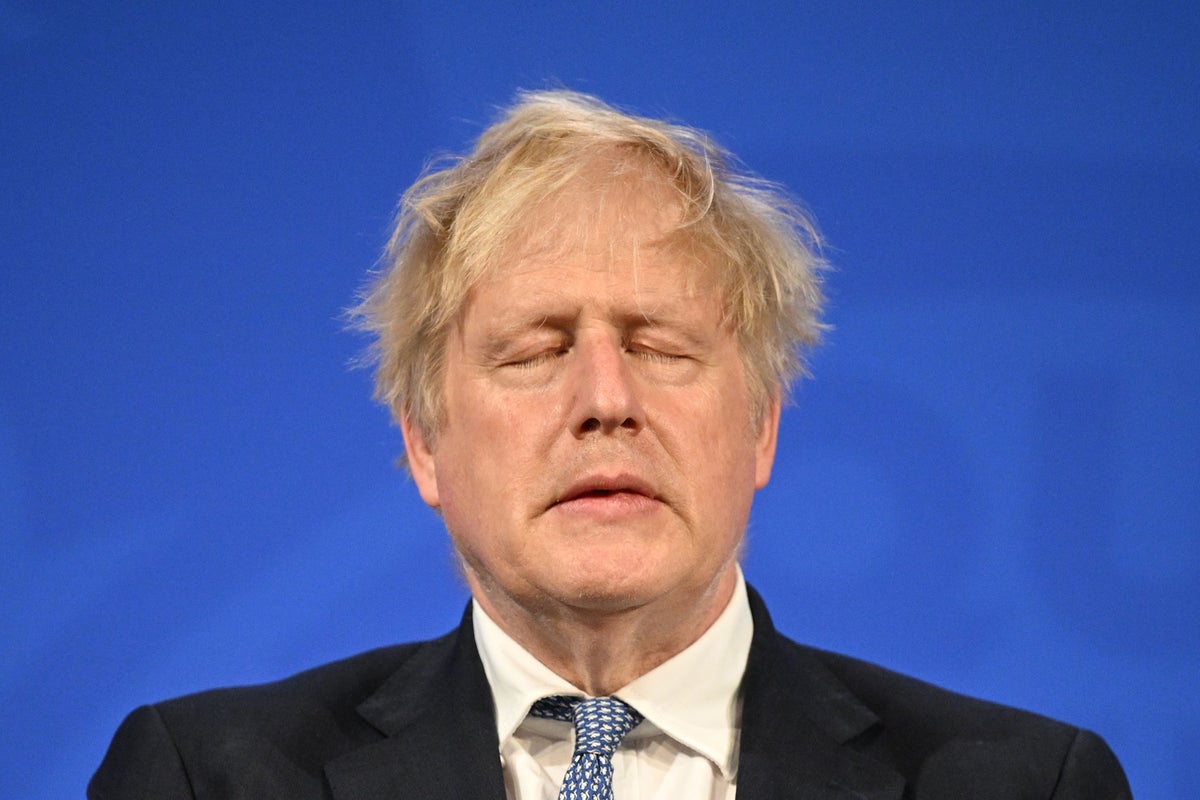
Boris Johnson remains under intense pressure to resign in the aftermath of the publication of Sue Gray’s report into pandemic rule-flouting in Downing Street and Whitehall, the “Partygate” scandal continuing to dog his every step despite his vain insistence that the country must move on.
Ms Gray, a respected veteran civil servant, was appointed in December 2021 to investigate a string of illicit drinks parties held behind closed doors at Westminster during lockdown when the public were being ordered to observe strict social-distancing laws and stay at home to prevent the spread of the coronavirus.
Her inquiry was delayed by the Metropolitan Police launching an investigation of its own based on the evidence she had collected, which ultimately led to 83 individuals receiving 126 fixed-penalty notices, the prime minister, his wife Carrie Johnson and chancellor Rishi Sunak among their number and forced to fork over £50 each.
That development, meaning Mr Johnson had broken the law in office, revived calls for his resignation after he appeared to have weathered the worst of the storm of indignation that threatened to topple him in December and January, a period when fresh stories about the scandal appeared almost daily in the press carrying anecdotes about wine fridges, “BYOB” garden parties and Christmas quizzes, infuriating members of the public who had been denied the opportunity to spend time with sick or dying loved ones out of respect for the laws this same government had imposed to keep Covid-19 at bay.
Following the eventual conclusion of the Met’s inquiry, Ms Gray was finally able to publish her dossier in full (a 12-page “update” had appeared on 31 January) on 25 May, which carried photographs and further lurid details of security staff being insulted by drunken revellers, janitors left to sponge claret stains from the walls of the corridors of power and staff stumbling out of “work events” in the early hours of the morning surreptitiously via a rear door.
“There were failures of leadership and judgement by different parts of No 10 and the Cabinet Office at different times,” Ms Gray wrote.
“Some of the events should not have been allowed to take place. Other events should not have been allowed to develop as they did.”
While Mr Johnson might have hoped his subsequent apology would draw a line under matters, he must still appear before the Commons Privileges Committee to answer questions about whether he knowingly misled Parliament about Partygate, having regularly denied holding any prior knowledge about what went on.
The PM has repeatedly insisted that supporting Ukraine and addressing the cost of living crisis are more important issues and attempted to defend his record by citing the speed of the UK vaccine rollout last year but few will be convinced by his rhetoric and many of his own MPs remain incensed.
At the time of writing, 28 have openly called for Mr Johnson’s resignation – including former attorney-general Jeremy Wright – and 16 have admitted to sending letters of no confidence to Sir Graham Brady’s 1922 Committee of axe-wielding backbenchers.
A total of 54 would be required to trigger a vote of no confidence in the Conservative Party leader and Andrew Bridgen MP, for one, has said he believes the true tally in Sir Graham’s hands is “close” to that number, representing 15 per cent of the 359 Tories in the Commons.
Two senior members of Parliament have meanwhile told The Financial Times that a loss in the upcoming by-elections in Tiverton and Honiton in Devon and Wakefield in West Yorkshire could inspire more Conservatives to reach for their feather quills.
“There will be another round of [no confidence letters] post the by-elections,” one unnamed MP was quoted by the newspaper as saying.
Among high-profile Tories to have been particularly scathing about Mr Johnson’s ongoing leadership was Tom Tugendhat, chair of the Foreign Affairs Committee, who said: “No 10 is the UK’s strategic headquarters, it has the responsibility to maintain operational capability whatever the circumstances. The prime minister put the governance of the UK at risk to a single, severe Covid outbreak. That is to say nothing of the lack of respect it showed for the British people or the Queen.”
Long-time critic Tobias Ellwood meanwhile rebuked the PM for seeking to distract from his problems with frivolous but headline-grabbing initiatives like the announcement of a consultation on the return of imperial weights and measures, a gesture intended to appeal to the party’s right-wing Brexiteers.
Mr Ellwood dismissed the venture as a sign his fellow Conservatives were “in denial” about the threat of ejection from office at the next election, describing it as “far from the inspirational, visionary progressive thinking that we require”.
Another veteran MP, who spoke to The Independent on condition of anonymity, said: “At the moment there is no obvious alternative leader for people to coalesce around, and I think Boris will probably survive the confidence vote.
“But the problem, as Theresa May found, is that simply being forced to a vote leaves you wounded, potentially terminally. After that first vote, I think people who see themselves as future leaders will put their heads above the parapet and say that they are ready to stand for election, and that changes the landscape considerably.
“He needs to provide some months of diligent and competent government, doing some solid work on which he can be judged. And frankly, we need to see a little less of him.”







